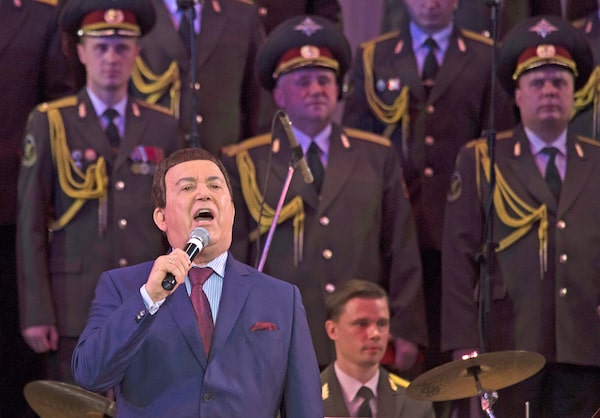
Russian singer Iosif Kobzon, sings during a concert in the town of Donetsk, Ukraine in 2014. He is said to have recorded 3,000 songs.Dmitry Lovetsky/AP
The standard shorthand is to describe Iosif Kobzon as “the Russian Frank Sinatra,” a moniker that encompasses both his career as a popular singer and suggestions that he had connections to the Russian mob.
But what with the hostage-negotiation heroics, the bombing that may or may not have been aimed at him and the international eyebrow-raising over his political positions, Mr. Kobzon, who died on Aug. 30 at 80, may have outdone even Ol’ Blue Eyes for high drama.
His death was announced on the website of the Duma, the lower house of Russia’s parliament, of which he had been a member since 1997. The location and cause were not given, but the Russian news agency Tass said Mr. Kobzon had been struggling with cancer since 2005.
Mr. Kobzon had a crooning baritone and a taste for patriotic songs, staking out that territory in 1962 with a rendition of Cuba, My Love, a paean to Fidel Castro, which he performed in a filmed version dressed as the Cuban leader.
He is said to have recorded 3,000 songs and, even after he announced his retirement from singing in 1997, he continued to perform for official holiday observances and for police and military parades. Russian President Vladimir Putin, whom Mr. Kobzon supported, issued a statement following the news of Mr. Kobzon’s death calling him “truly a people’s artist, an outstanding Russian cultural personality, a man of immense inner strength, courage and dignity.”
Iosif Davidovich Kobzon was born on Sept. 11, 1937, in Chasov Yar, in the coal-mining region of Eastern Ukraine, into a Jewish family. He was proud of that heritage, promoting Russian Jewish culture and standing up to anti-Semitism during his careers as a singer and a politician.
He was musical from a young age. “I cannot remember not singing,” he told The New York Times in 2002 of his childhood, which, he said, included once singing in a children’s group for an audience that included Josef Stalin.
While doing his compulsory military service from 1956 to 1959, Mr. Kobzon joined a song-and-dance group. Once back in civilian life, he began singing professionally, winning several international competitions in the mid-1960s and becoming omnipresent on radio and television during the Leonid Brezhnev era of the Soviet Union, which stretched from 1964 to 1982. More recent generations found his music stodgy, but he still commanded a certain reverence.
Although not everywhere. In 1995, the United States refused to issue him a tourist visa out of concern that he had ties to Russian organized crime, something he denied. He continued to be refused a visa over the years, although he did make one brief trip to the United States in 2000 as part of a parliamentary delegation visiting Harvard University.
The possibility of mob ties came up in 1999 when a bomb went off in Moscow’s Intourist Hotel, where Mr. Kobzon had offices. There was speculation that the bombing was an act of terrorism, a warning of some kind to Mr. Kobzon from the mob.
“I was supposed to be in the building,” Mr. Kobzon acknowledged later, “but I have friends in town and I left to meet them in their hotel.”
More recently, Mr. Kobzon came under travel and other restrictions from the European Union in 2015 because of his support of the pro-Russia factions in the territorial dispute with Ukraine. This year, Ukraine issued a decree stripping him of his honours from that country and freezing his assets there.
But many in Russia regarded him not only as a national treasure but also as a hero. He performed for troops and workers in Chernobyl just weeks after the nuclear accident there. And, in 2002, when Chechen rebels seized hundreds of hostages in a Moscow theatre, he was among a handful of negotiators who entered the building to try negotiating with the rebels.
His efforts helped secure the release of a few hostages, but the incident ended with a special-forces operation that left scores dead.
Mr. Kobzon leaves his third wife, Ninel; a son, Andrey; a daughter, Natalya; and 10 grandchildren.